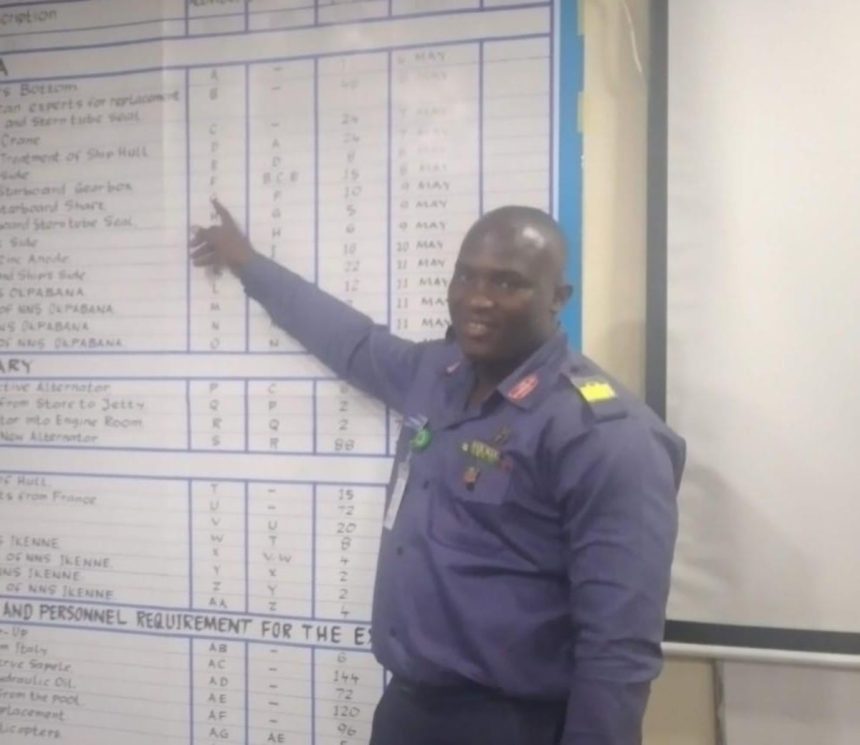In the modern age of defense technology, where global powers race toward automation, AI integration, and cyber-resilient systems, Nigeria faces a more fundamental challenge: developing homegrown technical expertise capable of sustaining and evolving its defense infrastructure. In this national conversation, Engr. Joseph Nnaemeka Chukwunweike has emerged as a quiet force — not only executing critical naval engineering duties but laying the groundwork for systemic innovation within the Nigerian Navy.
With an electrical and electronics engineering background from the Nigerian Defence Academy and over a decade of strategic deployments, Chukwunweike’s story is not one of luck — it is a narrative of purposeful skill development, leadership through mentorship, and a relentless push for indigenous engineering solutions.
From Circuit Boards to Strategic Thinking
Chukwunweike’s journey began with a singular focus: solving practical problems. From his earliest days aboard naval platforms like NNS OLOGBO and NNS KYANWA, he didn’t just maintain systems — he analyzed them, modified them, and ultimately improved them.
In high-pressure environments prone to unpredictable electrical faults, he introduced preventive diagnostics routines, enabling technical crews to anticipate faults rather than merely reacting. His work often meant mission-critical systems remained operational during sensitive operations, significantly reducing downtime and enhancing naval preparedness.
These improvements, though lacking fanfare, saved the Navy both resources and reputational risk — the hallmarks of sustainable military engineering.
Training as a Tool of National Security
What sets Chukwunweike apart is not just technical competence but the deliberate transfer of that knowledge to junior engineers and technicians. A vocal advocate of mentorship, he built informal but highly structured technical training routines for younger officers under his command.
Crew members often describe him as someone who “breaks complex problems into local language”, ensuring that learning is embedded not just in documentation, but in culture. This philosophy fostered a generation of naval engineers who no longer saw systems as black boxes but as interconnected, logical frameworks they could understand — and improve.
As one officer remarked, “He gave us the confidence to challenge assumptions, not just follow checklists.”
From Navy Ships to National Blueprint
His work became a de facto reference in several naval policy documents on system performance, power quality monitoring, and embedded safety practices. But perhaps more importantly, his methods carried civil applications.
For example, his diagnostic scheduling system — originally created for marine propulsion units — has since been proposed for adoption in civil aviation and national grid substations, where safety and uptime are equally mission-critical.
At a time when Nigeria seeks to build resilience into its energy and transport infrastructure, Chukwunweike’s local engineering logic serves as a viable model.
Indigenous Innovation in Defense
Too often, developing countries rely heavily on foreign diagnostics, maintenance contracts, or spare parts procurement that delay operations and deepen dependency. Chukwunweike challenged this model early in his career.
Onboard NNS OLOGBO, he developed a modular system for alerting crew to power surges and grounding faults, using locally sourced sensors and code-free configuration tools. His work eliminated repeated calls to external technicians, boosting crew confidence and mission sustainability.
It was a reminder that innovation does not always require foreign capital — sometimes it just takes deep systems knowledge and the drive to build for local conditions.
Where Leadership Meets Systems Thinking
In complex naval systems where propulsion, radar, and weapon electronics interact, siloed knowledge often leads to system conflicts or hazardous errors. Chukwunweike addressed this by integrating inter-departmental data into streamlined safety protocols.
His introduction of a shared electro-mechanical failure logbook — combining inputs from propulsion, electrical, and auxiliary crews — reduced fault misdiagnosis by over 40% across two naval commands. It became a small but powerful step in codifying tribal knowledge into institutional memory.
Looking Ahead: Nigeria’s Strategic Engineering Horizon
As Nigeria modernizes its defense and industrial backbone, engineers like Joseph Nnaemeka Chukwunweike will be critical not just as technicians, but as architects of resilience.
His ideas around predictive maintenance, local diagnostic intelligence, and interdisciplinary training are already being discussed in high-level defense strategy circles and may soon find applications in sectors as varied as rail, energy, and aviation.
The question is no longer whether Nigeria can lead in technical innovation — it’s whether we will empower more professionals like Chukwunweike to lead that charge.






